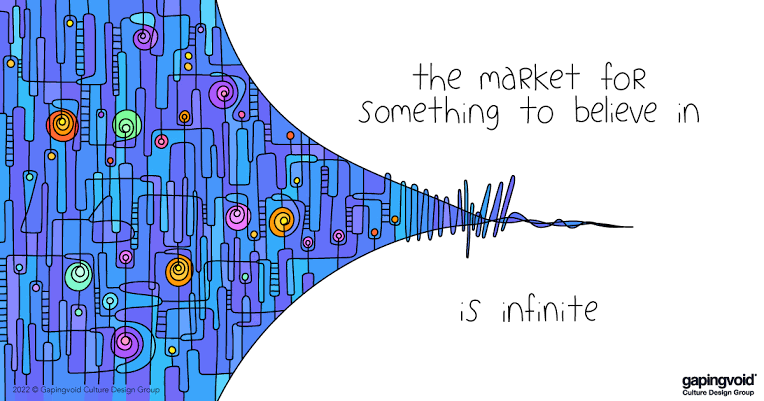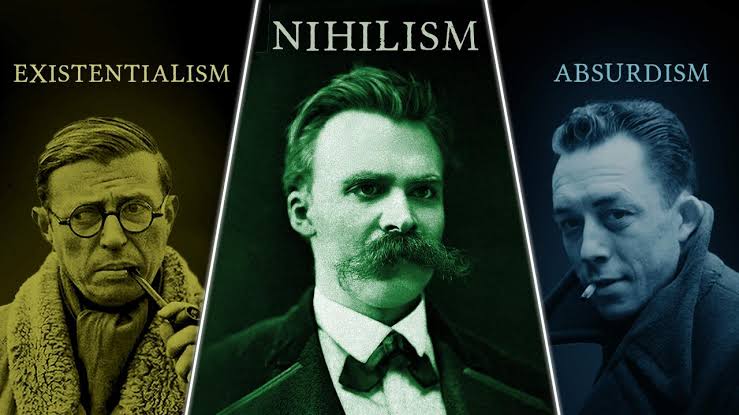"Nihilism, Existentialism & Absurdism" explores the three philosophical concepts and their differences. Nihilism argues that life has no inherent meaning, while existentialism holds that meaning is created through individual choices and experiences. Absurdism suggests that the search for meaning is futile, and life is inherently absurd. The blog explains the origins and key ideas of each philosophy and examines how they have influenced literature and culture. The author concludes that while these concepts may seem pessimistic, they can also offer a sense of liberation by freeing individuals from societal expectations and allowing them to create their own meaning in life

Nihilism in philosophy.
Nihilism is a philosophical belief that life has no inherent meaning, purpose, or value. It is often associated with a rejection of religious and moral principles and a sense of despair or pessimism about the human condition. Nihilists believe that all beliefs, values, and morals are baseless and that life is ultimately meaningless.

Nihilism can be traced back to the 19th century, when it was first introduced by Friedrich Nietzsche, a German philosopher who argued that traditional morality and religion were no longer relevant in the modern world. He believed that the idea of God was dead and that without a transcendent source of meaning, life was ultimately meaningless.
Nihilism has been a recurring theme in literature, particularly in the works of existentialist writers such as Albert Camus and Jean-Paul Sartre. It has also been associated with various forms of art, such as the nihilistic themes in the works of the punk and heavy metal music movements.
However, it is important to note that nihilism is not a universally accepted philosophical position, and many philosophers and thinkers have criticized it as being too extreme or simplistic. Some argue that it is possible to find meaning and value in life through personal experiences, relationships, or creative endeavors, even if there is no objective or universal source of meaning.

Existentialism philosophy
Existentialism is a philosophical and cultural movement that emerged in the 20th century, primarily in Europe. It emphasizes individual freedom, choice, and responsibility, and rejects the notion of predetermined fate or destiny. Existentialists believe that human beings must create their own meaning in life, as there is no inherent or objective purpose to existence.

Existentialism emphasizes the importance of personal experience and individual choice. It holds that individuals must create their own values and define their own existence, rather than relying on external sources of authority or tradition. According to existentialists, the human condition is marked by a sense of alienation and disorientation, and individuals must confront the reality of their mortality and the meaninglessness of their existence.

Existentialism has influenced a range of fields, including literature, psychology, and political theory. Some of the key thinkers associated with existentialism include Jean-Paul Sartre, Martin Heidegger, Friedrich Nietzsche, and Albert Camus.
Absurdism and human existence.
Absurdism is a philosophical and literary movement that emphasizes the meaningless and irrational nature of human existence, and the search for meaning and purpose in an inherently meaningless world. Absurdism is often associated with the works of the French philosopher Albert Camus, who wrote extensively on the subject.

According to absurdism, human beings live in a universe that is indifferent to their existence, and that has no inherent meaning or purpose. As a result, humans are left to create their own meaning in life, despite the inherent absurdity of their existence.

Absurdism is often expressed through literature and art, and it is characterized by the use of irony, humor, and satire to highlight the absurdity of human existence. It is also closely related to existentialism, which emphasizes the individual's freedom and responsibility to create meaning in life.

Relationship between Nihilism, existentialism, and absurdism.
Nihilism, existentialism, and absurdism are three philosophical perspectives that are often grouped together because of their shared concern with the meaning and purpose of human existence. However, while there is some overlap between these philosophies, they each offer distinct perspectives on the nature of human existence.
Nihilism is the belief that life has no inherent meaning or value. According to nihilists, there is no objective purpose to existence, and all values, beliefs, and goals are merely human inventions with no intrinsic worth. Nihilism can be seen as a rejection of traditional religious and moral values, as well as a critique of the idea that human life has an inherent purpose or meaning.

Existentialism, on the other hand, is a philosophy that emphasizes the individual's freedom and responsibility to create meaning in their own life. According to existentialism, human beings must create their own purpose and values, rather than relying on external sources of meaning such as religion or tradition. Existentialists reject the idea that there is a pre-determined, objective meaning to human existence, and instead embrace the ambiguity and uncertainty of life as an opportunity for self-discovery and personal growth.
Absurdism is a philosophy that acknowledges the inherent irrationality and meaninglessness of the world, but rejects nihilism by insisting that individuals can find meaning and purpose in spite of this. According to absurdism, human beings exist in a fundamentally absurd universe, where our search for meaning is always doomed to fail. However, rather than giving up in despair, absurdists embrace this absurdity and find meaning in the struggle itself. Absurdism is often associated with the works of writers such as Albert Camus, who believed that the only meaningful response to the absurdity of existence is to rebel against it and live life to its fullest.

In summary, while nihilism, existentialism, and absurdism all share a concern with the meaning and purpose of human existence, they offer distinct perspectives on these questions. Nihilism rejects the idea of inherent meaning, existentialism emphasizes the individual's responsibility to create meaning, and absurdism embraces the absurdity of existence as an opportunity for self-discovery and personal growth.



You must be logged in to post a comment.